Searching for the best island to visit in Hawaii for first time travelers? Congrats, you’re in the right place! You’re likely dreaming of sandy beaches, humpback whales, waterfall hikes, fresh poke, and warm aloha spirit.
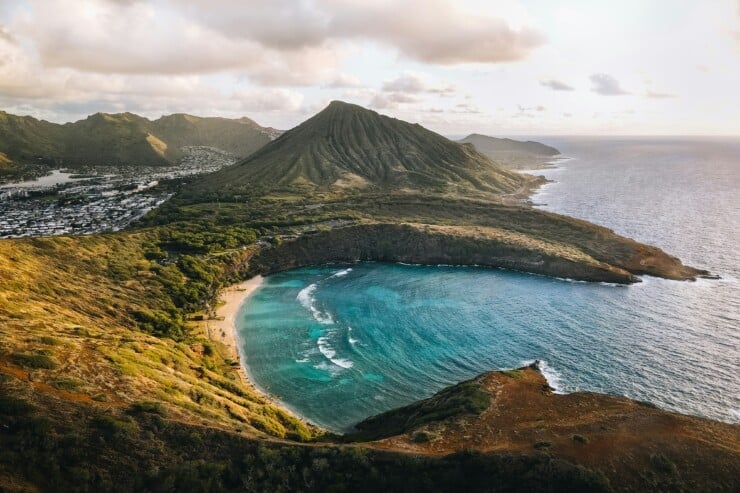
Key Takeaways
- This guide helps you choose the best Hawaiian island to visit based on your travel style, highlighting the unique experiences, landscapes, and vibes of each island.
- Oʻahu: Best for first-time visitors, history buffs, and food lovers; offers a mix of city life (Honolulu), historic sites (like Pearl Harbor), and natural beauty (North Shore surf).
- Maui: Ideal for couples and luxury travelers; known for upscale resorts, whale watching, the scenic Road to Hāna, and sunrise at Haleakalā National Park.
- Big Island (Hawaiʻi Island): Great for adventurers and geology lovers; features diverse landscapes, active volcanoes at Hawaiʻi Volcanoes National Park, and both black and white sand beaches.
- Kauaʻi: Suited for nature lovers and return visitors; offers dramatic scenery with the Nā Pali Coast, lush rainforests, and a laid-back vibe.
There are six major Hawaiian Islands to choose from: O’ahu, Island of Hawai’i, Maui, Kaua’i, Lānaʻi, and Moloka’i. Each island has its unique charm, vibe, and must-see attractions. Picking the best island to visit in Hawaii for the first time can be overwhelming. But don’t worry: we’re here to help.
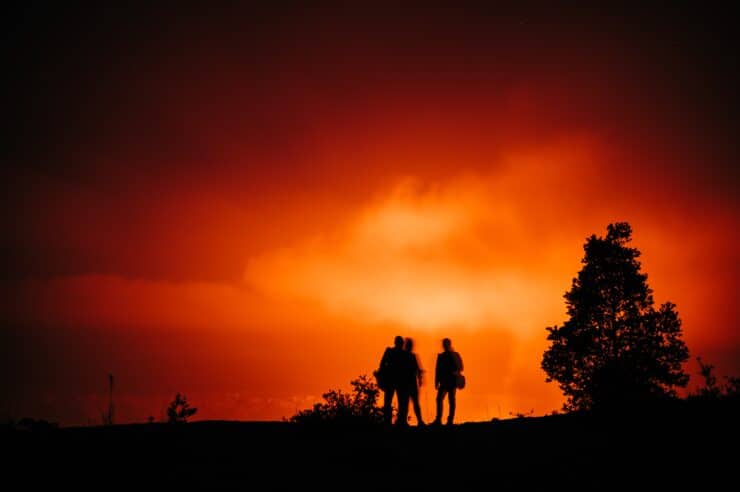
Why Travel to Hawai’i?
We could talk up the natural beauty that spans from lava-spewing volcanoes to lush rainforests. Or the rich Hawaiian culture, which includes hula, lū’aus, and enchanting music. Or the food scene, which includes farm-to-table eats, fine dining meals, sunset cocktail bars, roadside food trucks, and local grub. The point is, Hawai’i’s more than a vacation—it’s an experience.
Whether you’re drawn to waterfalls, world-class sports, or authentic Hawaiian food, each island has something for everyone. The question then isn’t whether you should go but which island to choose. This is the question we help our Hawai’i travel clients with regularly, so we have thoughts!
Look, there’s no wrong choice. But there is a best island to visit in Hawaii for first time travelers based on your travel style. Consider what kind of trip you want: the best way to experience Hawaii is to find the island that matches your vibe.

Why You Should Trust Us
We are a team of Hawai’i travel experts here at Salt & Wind Travel. We’ve spent over a decade writing about food and travel. In that time, we have curated 100s of custom itineraries for clients heading to Hawai’i from honeymooners and solo travelers to families on summer or spring break.
Our founder is married to a native Hawaiian and often visits in-laws on O’ahu. Meanwhile, I was raised on Kaua‘i, and I have explored every major Hawaiian island, from Moloka’i to the Big Island.

What is the best island to go to for the first time in Hawaii?
For a bit of everything—great food, beaches, history, and nightlife—Oʻahu is the best island to visit in Hawaii for first time travelers. It offers a taste of modern Hawaii as well as surfing on the North Shore and cultural landmarks like ‘Iolani Palace, the Bishop Museum, and Pearl Harbor.
For pure relaxation, where you won’t be leaving the resort, most opt for Maui or Lānaʻi. If you are after calm waters, waterfall hikes, and rainforest vibes, you’ll likely want to choose Kaua’i. Meanwhile, our personal favorite is the Big Island of Hawaii, as it offers an abundance of natural beauty to explore.

The Best Island To Visit In Hawaii First Time Travelers: Island by Island
We’ll guide you through each of the main islands in the state of Hawaii so you can find your perfect choice. From bustling cities to laid-back small towns, each island has something to offer first-timers.

Oʻahu: The Gathering Place
Population: 995,000 (nearly 80% of the state’s population)
Best for: First-time visitors who want a blend of city life, history, and nature
As the most populous Hawaiian island and home to Honolulu, Oʻahu is often the best island to visit in Hawaii for first time travelers. The center of life on the island is the bustling city of Honolulu, which has high-rises surrounding Waikīkī beach
O’ahu is the epicenter of modern culture in Hawaii, with world-class food and bars, a diverse array of exciting neighborhoods (from edgy Chinatown to creative Kaka’ako), and the state’s best museums. You’ll want to spend some time in “town” or Honolulu to experience history, and then spend some time on the quieter “North Shore,” where the world’s best surfers converge.
Food
Some of Hawaii’s top chefs and restaurants are here, blending traditional Hawaiian food with global flavors. Don’t miss a plate lunch at a classic drive-through, live music and cocktails at sunset in Waikīkī, or dim sum in Chinatown.
Five Top O’ahu Attractions
- Waikīkī Beach for swimming and surfing
- Diamond Head for hiking and panoramic views
- Pearl Harbor and the USS Arizona Memorial to reflect on WW 2
- North Shore for big waves and surf competitions
- ‘Iolani Palace or the Bishop Museum for local history
Lodging
Short-term rentals are restricted, so most visitors stay in hotels in Waikīkī, Ko’Olina, or on the North Shore. We don’t like Ko’Olina as it’s removed and arid, but some travelers love it.
Pros
- Great for families and groups
- Tons of activities and nightlife
- Ideal for those who want a mix of town and beach
Cons
- Crowded in the winter months
- Less laid-back than other islands

Island of Hawaiʻi (Big Island): For the Adventurers
Population: 190,000 residents (2nd most populated island )
Best for: Honeymooners, outdoor enthusiasts, and travelers seeking cultural experiences and biodiversity.
The Island of Hawaiʻi, commonly referred to as the Big Island, is ideal for those who want to explore nature’s extremes. If you’re curious about lava, lush jungles, and sea turtles, this could be the only island you need.
Our honeymooners go here to be pampered, as some of the best luxury hotels in Hawaiʻi are on the Kohala Coast. Meanwhile, our families enjoy visiting Kona and the Captain Cook area for a mix of farms, history, and beaches.
We love the Big Island for its diversity. It has more growing zones than any other place on earth, boasts the largest mountain on the planet, and is renowned for its volcanoes. As the youngest island in the archipelago, it exudes a lively natural vibe or energy (known as mana in Hawaiian).
It’s home to many of the state’s farms (from cacao to coffee to cheese and honey), black sand beaches, Hawai’i Volcanoes National Park, and the cowboy culture of Waimea (where the weather is like the Pacific Northwest). The only downside is that this island is BIG, so it requires driving.

Food
From Kona coffee and macadamia nuts to cacao farms and ranch-raised beef in Waimea, the Big Island boasts one of the most diverse agricultural scenes.
There, the paniolo (a word of Spanish origin referring to cowboys in Hawaiʻi) culture runs deep. In the late 18th century, cattle arrived as gifts for King Kamehameha I, who placed a kapu – aka a law, meaning forbidden – on killing the animals.
As a result, the cattle population grew until Mexican vaqueros arrived to teach Hawaiians how to wrangle and manage them. Today, Hawai’i Island produces most of the beef in Hawai’i, with the majority coming from Parker Ranch, one of the oldest and largest cattle ranches in the United States.
With all that history, it’s no surprise that Hawai’i Island – specifically, Cafe 100 in Hilo – is the de facto birthplace of the Loco Moco. This classic dish consists of a cooked beef patty atop rice, drenched in gravy, and topped with a fried egg.
Five Top Big Island Attractions
- Hawai’i Volcanoes National Park with active volcanoes like Maunaloa and Kīlauea
- Black sand beaches and lava fields
- Snorkeling within Kealakekua Bay or A-Bay
- Stargazing at Mauna Kea
- Historic sites like Puʻuhonua o Hōnaunau or Puʻukoholā Heiau
Lodging
Luxe resorts line the Kohala Coast (great for honeymooners), while family travelers may opt for spots in Kona or Hilo.
Pros
- The most diverse scenery of all the islands
- Great for hiking, snorkeling, and whale watching
Cons
- Requires driving long distances
- Limited nightlife
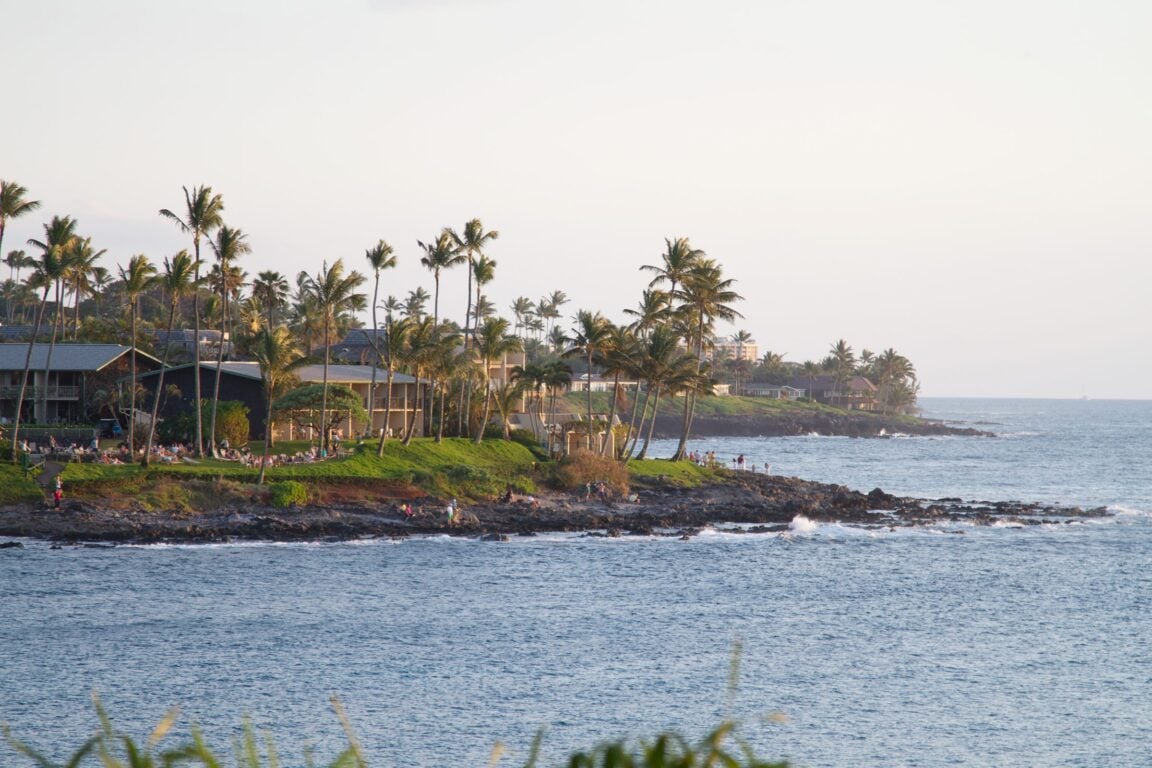
Maui: The Resort-Meets-Nature Hybrid
Population: 168,000 residents (3rd most populated island )
Best for: Visitors who want classic resorts with access to natural beauty
Nicknamed the Valley Isle, Maui needs no introduction. Maui is the best island to visit in Hawaii for first-time travelers who prioritize relaxation.
Of the main Hawaiian islands, Maui is the one our travel clients request the most. We get it: whether you’re here for a honeymoon or a friends’ getaway, Maui delivers on that dream Hawaii vacation feel. However, it’s also essential to see the whole island, as the main resort areas —Wailea, Kihei, Kapalua, and Kāʻanapali —can be extremely touristy and feel detached from the local culture.
We appreciate Maui’s natural wonders, including upcountry farms, Haleakalā National Park, the Road to Hana, the Seven Sacred Pools, and renowned surfing spots. We suggest staying in Kapalua or Wailea if you prefer a resort setting, and then exploring the less-traveled path in Hana or Upcountry for a few days.
Food
Don’t miss the Upcountry farms, roadside banana bread in Hana, creative food in Wailea, and seafood in Lahaina.
Five Top Maui Attractions
- Snorkeling at Molokini Crater
- Road to Hana with jungle waterfalls and black sand beaches
- Kapalua and Wailea for luxury relaxation
- Whale watching in the winter months
- Haleakalā National Park for sunrise
Lodging
You’ll find high-end resorts in Kapalua and Wailea, with vacation rentals more common in Upcountry, Kāʻanapali, or Kihei.
Pros
- World-class beaches and hiking
- Great for couples and luxury travelers
- Excellent food and wine scene
Cons
- Very touristy in resort areas
- Prices can be steep
- Has a lot of mainland transplants, so some areas lack Hawaiian culture

Kauaʻi: The Garden Isle
Population: 47,000 residents (4th most populated island )
Best for: Nature lovers, couples, and anyone seeking peace and quiet
Kauaʻi is ideal for slow travelers who want to immerse themselves in nature. If you’re looking for natural beauty and solitude, Kauaʻi is your island. From the woodsy mountains of Koke’e to the working taro fields in Hanalei, there’s a lot of nature packed into one of the minor islands in the chain.
It’s the oldest of the archipelago’s populated islands, known as the Garden Isle due to its lush rainforest environment. It’s also home to Mt. Waiʻaleʻale, dubbed the wettest spot on earth. It’s arguably the best island to visit in Hawaii for first time visitors looking for a slow pace and tropical beauty.
The “Grand Canyon of the Pacific” is there, a red sand wonderland, as well as the stunning NāPali Coast, which you can explore by hiking, boating, or helicopter. The South Shore has more resorts, so we prefer the North Shore, with its peaceful bay and quaint local scene.
Food
Expect locally sourced ingredients—such as taro, fish, and tropical fruits—with plenty of down-to-earth eateries in Hanalei, Līhuʻe, and Poipu.
Five Top Kauaʻi Attractions
- Waimea Canyon, the “Grand Canyon of the Pacific”
- The NāPali Coast (hike, boat, or helicopter to see)
- Waterfalls and hikes galore
- Waimea River adventuring
- Hanalei Bay for SUP and calm surf
Lodging
Resorts line the South Shore in Poipu, while condos are numerous in Kapa’a and Wailua. The North Shore offers a more boutique and luxurious experience.
Pros
- Stunning natural scenery
- Slower pace of life
- Incredible hiking and outdoor activities
Cons
- Limited nightlife
- Occasional flooding on the North Shore in winter

Molokaʻi: Hawaii Unplugged
Population: 7,000 residents
Best for: Travelers wanting a rural Hawaii experience
Few visitors make it to Moloka’i, which makes it a hidden gem, but also a destination that is very much off the beaten path. It’s ideal for those seeking a connection to local culture, rather than resort crowds.
This island is rugged, with very limited lodging and public transportation options. It is best suited for travelers who want to camp or immerse themselves in nature, and we don’t recommend it for first-time visitors.
Food
Expect local-style plate lunches, fresh-caught fish, and mom-and-pop eateries.
Top Attractions
- Kalaupapa National Historical Park
- Hiking and waterfalls
- Exploring ancient fishponds
Lodging
A few small inns and vacation rentals—no big hotels or resorts here.
Pros
- No crowds
- Deep cultural immersion
- Beautiful untouched nature
Cons
- Very limited infrastructure
- Not ideal for first-timers wanting variety

Lānaʻi: The Quiet Luxury Getaway
Population: 3,300 residents
Best for: Couples and solo travelers seeking off-grid luxury
Lānaʻi is the best island to visit in Hawaii for first time travelers who want a splurge-worthy retreat. With only a few hotels and hardly any crowds, it’s pure peace and quiet. We send the fewest clients to Lanai because most of our clients prefer more options for activities.
Food
Hotel-based restaurants dominate, offering high-end cuisine using local produce.
Top Attractions
- Snorkeling and dolphin watching at Hulopoe Bay
- Exploring the lunar-like Garden of the Gods
- Off-roading to Shipwreck Beach
Lodging
Two Four Seasons resorts dominate—one beachfront and one in the mountains.
Pros
- Secluded and serene
- Top-tier service
- Great for unplugging
Cons
- Limited dining and attractions
- Expensive
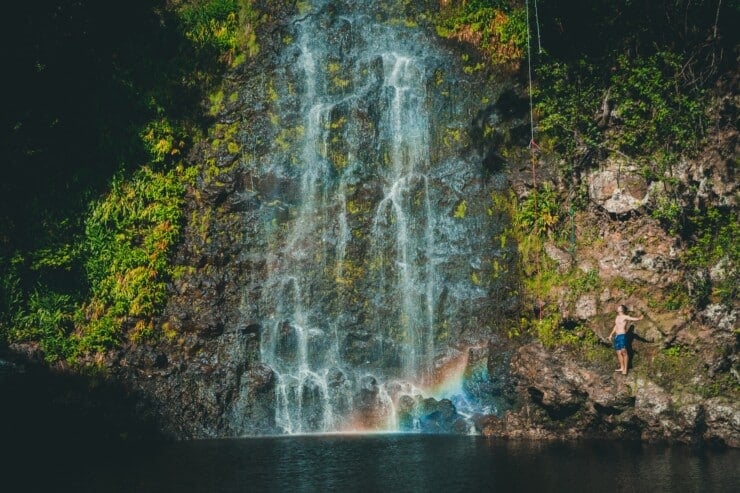
When is the best time to go to Hawaii to avoid crowds?
To us, the shoulder seasons, April to early June and September to early November, are the best times to go to Hawai’i. You’ll find fewer crowds, good weather, and lower prices.
The winter months (especially December through February) are peak season, with larger crowds and big waves on the North Shore for surfing, but also more expensive lodging.
Most of our travel clients plan a 10-day to three-week trip to Hawaii, visiting two or three islands during their journey. Of all the places we work, we believe that slow travel is essential in Hawaii, as it’s the best way to get to know the culture and understand the differences among the various islands. And remember: if one island doesn’t check every box, there’s always next time—and trust us, there will be a next time.
Frequently Asked Questions About Best Island To Visit In Hawaii For First Time
For first-time visitors, Oahu is often recommended due to its blend of cultural experiences, historic sites like Pearl Harbor, and famous beaches like Waikiki. Maui is another great option for its beautiful beaches, the Road to Hana, and Haleakalā National Park. If you're able to visit multiple islands, we suggest mixing in quieter spots like the Big Island or Kauai.
Each Hawaiian island offers a unique experience thanks to unique geography, culture, and history. Oahu is known for its vibrant city life and surf culture; Maui for its scenic drives and luxury resorts; Kauai for its lush landscapes and outdoor adventures; the Big Island for its volcanoes and diverse climates; and Lanai for its secluded luxury and natural beauty.
Yes, it's possible to visit multiple Hawaiian Islands in one trip. However, it's recommended to spend at least 3 to 5 days on each island to truly experience what each has to offer without feeling rushed.
Get A Personalized Travel Itinerary
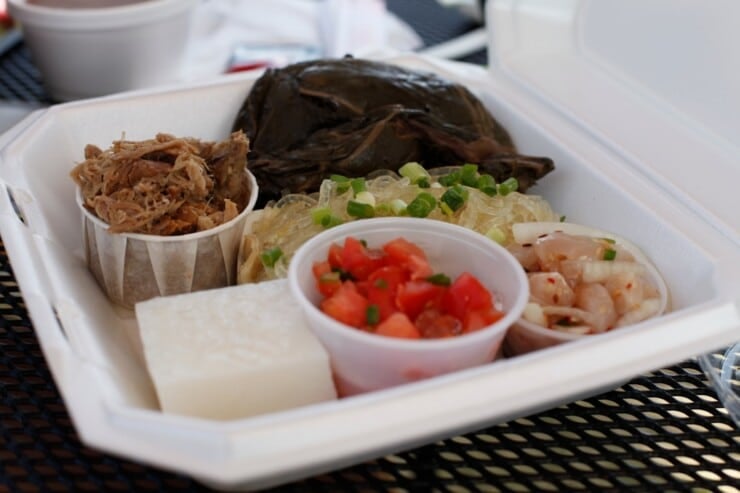
Local And Hawaiian Food To Know
Now that you know which Hawaii islands to visit, read up on local and Hawaiian food dishes to know. From traditional Hawaiian foods like poi and lomi lomi to local comfort foods like saimin and farm-to-table cuisine, there is a wealth of options to enjoy!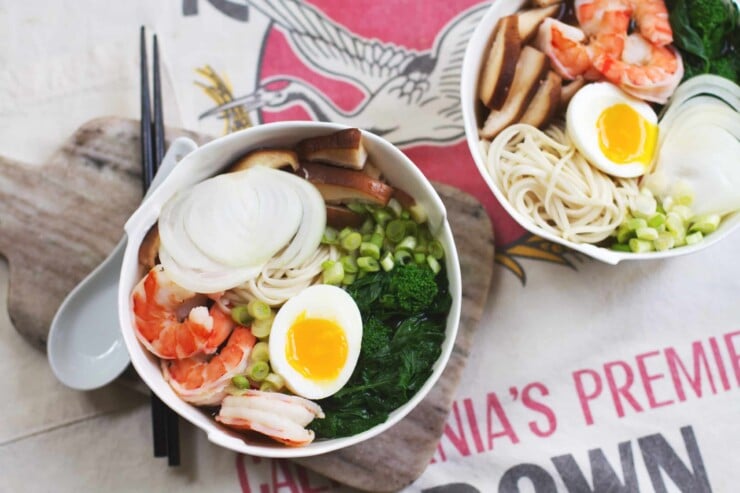
Recipes Inspired By Hawai’i
Not heading to Hawaii quite yet? Here are a few of our favorite local Hawaiian recipes to make at home to stoke your wanderlust:
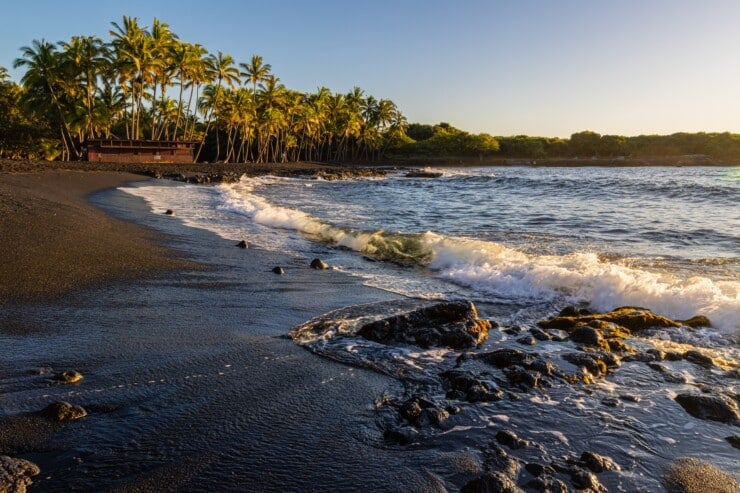
Hawai’i Travel Guide
Looking to travel to the Aloha State soon? Check out our Hawai’i travel guide with tips for where to eat, where to stay, and what to do across the islands.
Have Us Plan Your Hawai’i Trip
Did you know that we’re also a boutique travel agency specializing in Hawai’i vacation planning? If you’re looking to plan a trip to Hawai’i, our Hawai’i trip planner services are here to help you plan your perfect itinerary.
Photo Credit: Photos from Unsplash
Hawaiian Diacritical Marks: To ensure accuracy and respect for the Hawaiian language, we use diacritical marks in our articles on the region. For more about which marks are used in the language and how to find proper spelling, refer to this Hawai’i Magazine article.